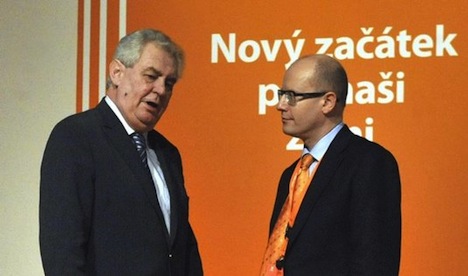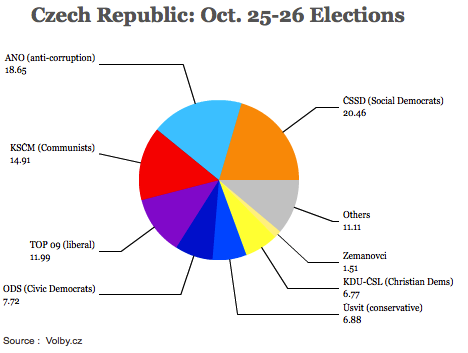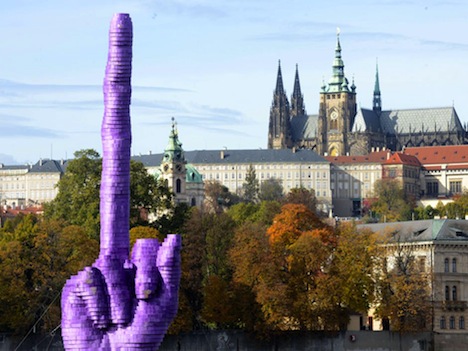Normally, party leaders face the boot when they lose elections, not after they win them.![]()
But that’s what happened in the Czech Republic, when the center-left Česká strana sociálně demokratická (ČSSD, Czech Social Democratic Party) narrowly topped the country’s parliamentary elections in late October with just over 20% of the vote.
Though the Social Democrats won the election, they took just 50 out of 200 seats in the Poslanecká sněmovna (the Chamber of Deputies), the lower house of the Czech parliament, and only nearly edged out a new populist, anti-corruption, business-friendly party, the Akce nespokojených občanů (ANO, Action of Dissatisfied Citizens), founded just two years ago by wealth businessman Andrej Babiš.
That left the leader of the Social Democrats, Bohuslav Sobotka, in a difficult position. The fractured result means that the Social Democrats will have to find at least another 50 deputies in order to govern — and despite the willingness of the Social Democrats to work alongside the Komunistická strana Čech a Moravy (KSČM, Communist Party of Bohemia and Moravia) for the first time in the post-Soviet era, the 33 seats that the Communists won won’t alone be enough to float a Social Democrat-led government.
But what left his leadership truly in question was a split between two wings of his party, a pro-Sobotka wing that hopes to keep its distance from the Czech Republic’s new president, Miloš Zeman, and a pro-Zeman wing that seeks closer collaboration between the two. Zeman led the Social Democrats over a decade ago, and he served as Czech prime minister from 1998 to 2002. A falling-out with the ČSSD leadership in the mid-2000s, however, caused Zeman to quit the Social Democrats and form a new party.
Zeman triumphed in his own right in the January 2013 presidential election — the first such direct election in Czech politics — and has spent the greater part of the year trying to muscle even more power for the Czech presidency at the expense of the parliamentary government.
So almost immediately following the election, Zeman (pictured above, left, with Sobotka) and top members of the pro-Zeman wing of the Social Democrats, including the party’s deputy leader Michal Hašek, held a secret meeting. That preceded a call for Sobotka to step down as leader on the basis that Sobotka’s personalized, centralized campaign led to a poorer-than-expected result.
The ‘coup’ soon fell apart, though — Hašek and other participants in the secret meeting with Zeman lied about it, Sobotka rallied his supporters against Zeman’s interference in internal party affairs, Czech overwhelming blamed Hašek for causing political instability and so, for now, Sobotka remains leader and Hašek has stepped down as deputy chair.
Sobotka won a battle, but it’s far from clear that he’ll even be the next prime minister. Continue reading Sobotka turns to forming government after troubling internal ČSSD revolt




